10
JanNew Year Special : Get 30% OFF + $999 Study Material FREE - SCHEDULE CALL
In today's digital age, software is used in mobile apps and websites for complex enterprise systems. Software testing is critical in ensuring these applications are functional, reliable, and user-friendly.
As a software tester, you will identify and fix bugs, ensure that the software meets the required standards, and provide feedback to developers to improve the user experience.
A professional and financial career in software testing can be highly rewarding. With the increasing demand for software testers in the tech industry, you can expect to have plenty of job opportunities and career growth prospects.
If you're passionate about technology and enjoy problem-solving, then a career in software testing could be the perfect fit for you. So why not consider taking the first step and exploring the exciting software testing world?
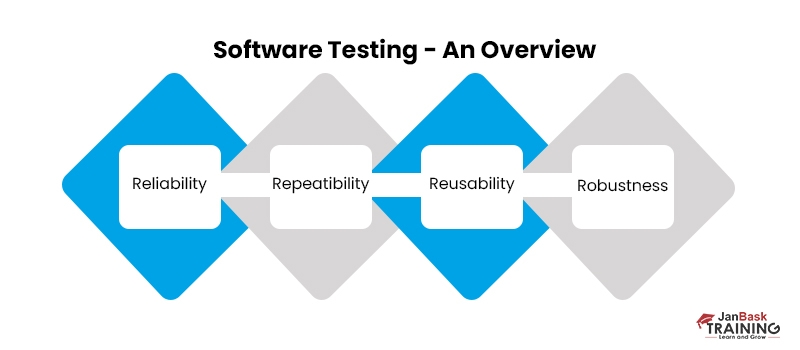
Software testing becomes more significant as the world becomes more dependent on technology.
software testing careers can be very lucrative both professionally and monetarily. According to Payscale, the average salary for a software test engineer in the US is around $74,000 annually. The salary ranges from around $51,000 to $105,000 annually, depending on experience, skills, and location.
Additionally, with a projected job growth rate of 10¾tween 2019 and 2029, job prospects in the industry are anticipated to grow faster than average due to the rising demand for software testers. There are many chances for career advancement in software testing. You can advance to higher-level positions like test lead, test manager, or quality assurance manager as you acquire experience and expertise.
Additionally, you can specialize in a particular area of software testing, such as automation testing, performance testing, or security testing, to name a few. However, the software testing career growth path explains to succeed in a career in software testing; you will need to have a strong understanding of software development and testing methodologies.Â
You'll also need excellent analytical skills, a keen eye for detail, and the ability to work well under pressure. Communication and teamwork skills are also important, as software testers work closely with developers and other stakeholders. Learn QA training today and pave the way for a successful career in software testing.
The software testing career path typically involves starting as an entry-level software tester and progressing to more senior roles with increasing responsibility and leadership. Here are some of the typical career levels and their salary in software testing:
1. Junior software tester: This is an entry-level position where individuals typically work under the guidance of more experienced testers. They perform basic testing tasks, such as running test cases, logging defects, and providing testing status updates.
The average salary for a junior software tester in the United States is around $49,000 annually.
2. Software tester: As testers gain more experience, they can progress to a software tester position. In this role, they perform more complex testing tasks, such as developing test cases and plans, designing and executing automated tests, and analyzing test results.
The average salary for a software tester in the United States is around $62,000 annually.
3. Senior software tester: Senior software testers have significant experience in software testing and can take on more leadership and mentorship responsibilities. They may lead testing teams, develop strategies, and manage testing projects.
The average salary for a senior software tester in the United States is around $86,000 annually.
4. Test lead: Test leads manage testing teams and ensure testing is completed on time and within budget. They collaborate with project managers, developers, and business stakeholders to define testing objectives and to ensure that testing aligns with the overall project goals.
The average salary for a test lead in the United States is around $87,000 annually.
5. Test manager: Test managers oversee all aspects of testing in an organization. They develop testing policies and procedures, manage testing budgets and resources, and provide leadership and mentorship to testing teams.
The average salary for a test manager in the United States is around $100,000 per year.
In addition to these traditional career paths, software testers can specialize in specific testing areas, such as automation, performance, security, or mobile testing.
Salary for 2 years of experience in testing in India can expect to earn around 3-5 lakhs per annum.
Testing has multiple levels, types, and specializations that have given a different level of the intrinsic value of a software tester. Unlike earlier, testing is one of the most popular career choices today. In the following diagram, you can quickly examine the multiple options for a quality software engineer.

In the technical world, testing is the primary choice for aspiring youths. The testing career path is also interesting from the beginning, leading to later quality assurance manager opportunities. Even the number of software testing tools available in the technical marketplace is enormous.
The demand for specialized testing engineers is increasing every passing day. Few may have expertise in scriptwriting, while others may be good at operating different testing tools. This is completely based on the choice of the Company for which option they want to opt.
How well you can achieve your testing goals solely depends on the testing capabilities of a software testing team. For this purpose, you should have a perfect blend of testers who can work effectively to achieve common testing goals. This would be great if testers had different domain knowledge and specialized in various niche areas.
Most importantly, the software testing team should have a proper structure where roles and tester software job descriptions should be clearly and properly defined. When the team is well-defined, each member can handle their work precisely. It would affect not only the individual's performance but also the overall performance of a testing team. The results are even more visible when all team members are serious and pretty much sure about the testing goals.
In the below sections, we have defined software testing engineer roles and responsibilities so that you can get a clear idea of your job based only on the Company standards.
Testing professionals may come from a variety of backgrounds. This is the reason why Companies define multiple job roles and responsibilities. Let us take you one step ahead to find the different levels in a software testing team.
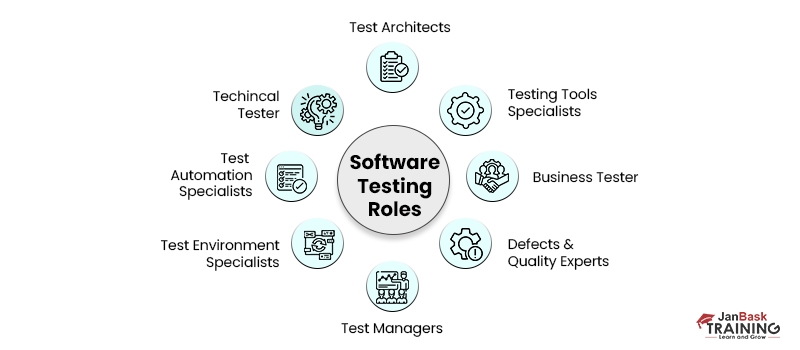
Let us discuss the hierarchy of job responsibilities for different testing roles as defined by the most reputed IT Companies to Create a Software Tester Resume.
Becoming a successful software tester requires combining technical skills, soft skills, and personal qualities. Here are some tips to help you become a successful software tester in the future:

Read: What Is The Difference Between Smoke And Sanity Testing?
Becoming a successful software tester requires combining technical skills, soft skills, and personal qualities. Here are some tips to help you become a successful software tester in the future:
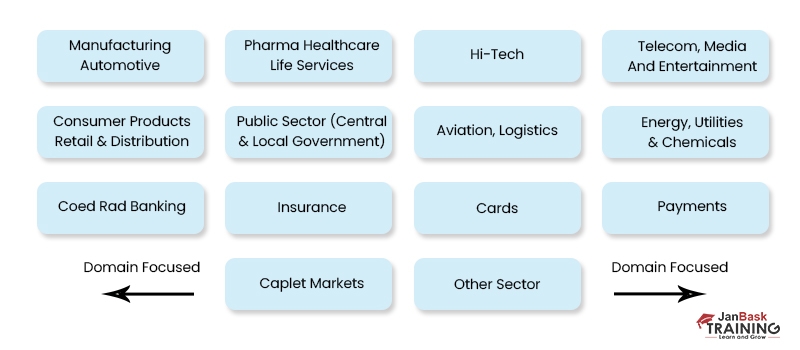
Becoming a successful software tester in the future requires general skills in testing and specialized skills in niche areas. Here are some of the niche areas in testing that you can focus on to become a successful software tester:
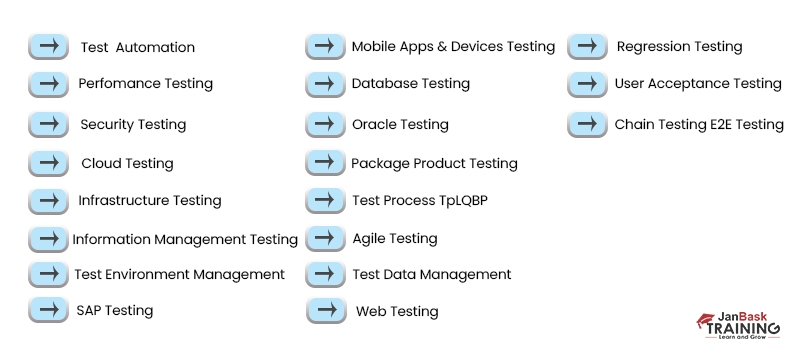
It is important to have hands-on experience with different testing tools to become a successful software tester. Here are some tips on how to gain hands-on experience in testing tools:
Today, various institutes offer online training and certifications in different testing domains. JanBask is one of the most popular names to take you one step ahead in the testing industry with its job-oriented testing training programs and certifications. To know more about JanBask training programs, you should immediately start with our testing training courses and certifications.
The software tester's career path discussion is incomplete without knowing the educational background and the salary taken by the software tester.
Once you have entered the manual testing space, alternative testing career paths or career choices could be as follows:
Are you still testing to determine your career path? Here are some aptitude tests you can attempt to improve your knowledge and get hired by companies quickly. A software tester's career path is quite interesting as he grows. So, you must understand it well before entering the testing space.
Here are some pointers you can use to guarantee a prosperous QA career:
You can have a prosperous job in quality assurance and contribute significantly to your company by using the advice in this article. Constant learning, attention to detail, clear communication, and acceptance of new tools and practices are the keys to success, so keep that in mind.
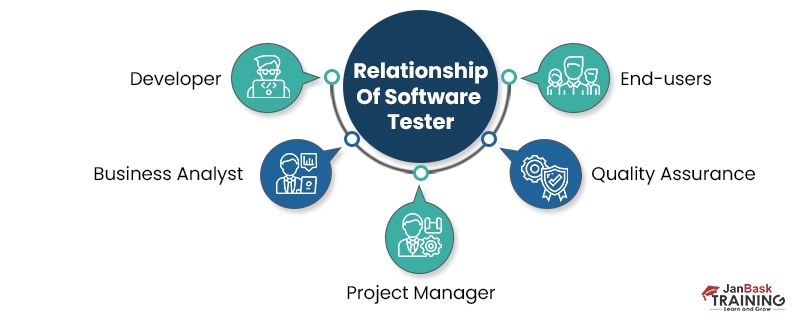
Software testers work closely with various stakeholders involved in the software development process. Here are some of the key relationships that software testers typically have:
In summary, software testers have important relationships with various stakeholders involved in the software development process, including developers, business analysts, project managers, quality assurance professionals, and end-users.

In conclusion, a career in software testing is a promising path for tech enthusiasts interested in ensuring software applications' quality and reliability.
With the ever-increasing demand for software products in various industries, the need for skilled testers is growing, and the field is becoming more important.
While there are challenges in software testing, the rewards are significant, and those who are passionate about the field have the opportunity to make a valuable contribution to their organizations and society as a whole.
By following the tips outlined in this article and continuously learning and growing, tech enthusiasts can build a successful career in software testing and become a vital part of the software development process.
Ready to dive into the world of software testing? Our QA online training program can help you get there. Sign up now.
Q 1. What is software testing job?
Software testing is a process of evaluating a software application to ensure that it meets the specified requirements and performs as expected. The primary objective of software testing is to identify defects, errors, and bugs in the software, and to report them to the development team for fixing. Testing can be done at different stages of the software development lifecycle, including functional testing, regression testing, performance testing, security testing, and more.
Q2. What are the types of jobs in software engineering?
There are several types of jobs available in software engineering, including
These are just a few examples of the many types of jobs available in software engineering, and the roles and responsibilities can vary widely depending on the company and the specific project.
Q 3. How to start software testing career?
Starting a career in software testing typically requires a combination of education, training, and practical experience. Here are some steps to help you get started:
By following these steps, you can start building a successful career in software testing and work your way up to more advanced roles and responsibilities over time.
Q 4. How to get software testing job without experience?
Getting a software testing job without prior experience can be challenging, but it is not impossible. Here are some tips that can help you land a software testing job even without experience:
By following these tips, you can increase your chances of landing a software testing job even without prior experience. Remember to stay positive and persistent in your job search.
 Pinterest
Pinterest
 Email
Email
The JanBask Training Team includes certified professionals and expert writers dedicated to helping learners navigate their career journeys in QA, Cybersecurity, Salesforce, and more. Each article is carefully researched and reviewed to ensure quality and relevance.

Cyber Security

QA

Salesforce

Business Analyst

MS SQL Server

Data Science

DevOps

Hadoop

Python

Artificial Intelligence

Machine Learning

Tableau
Search Posts
Related Posts
Choosing the Right Performance Testing Tools: A Comprehensive Guide
![]() 834.8k
834.8k
Top Intelligent Automation Trends & Predictions Businesses can’t Ignore
![]() 5k
5k
Alpha Vs. Beta Software Testing: What Is the Difference
![]() 8.1k
8.1k
How to Become a Successful Software QA Tester?
![]() 479.7k
479.7k
How Much Does A Performance Tester Earn In Different Countries?
![]() 2k
2k
Receive Latest Materials and Offers on QA Testing Course
Interviews